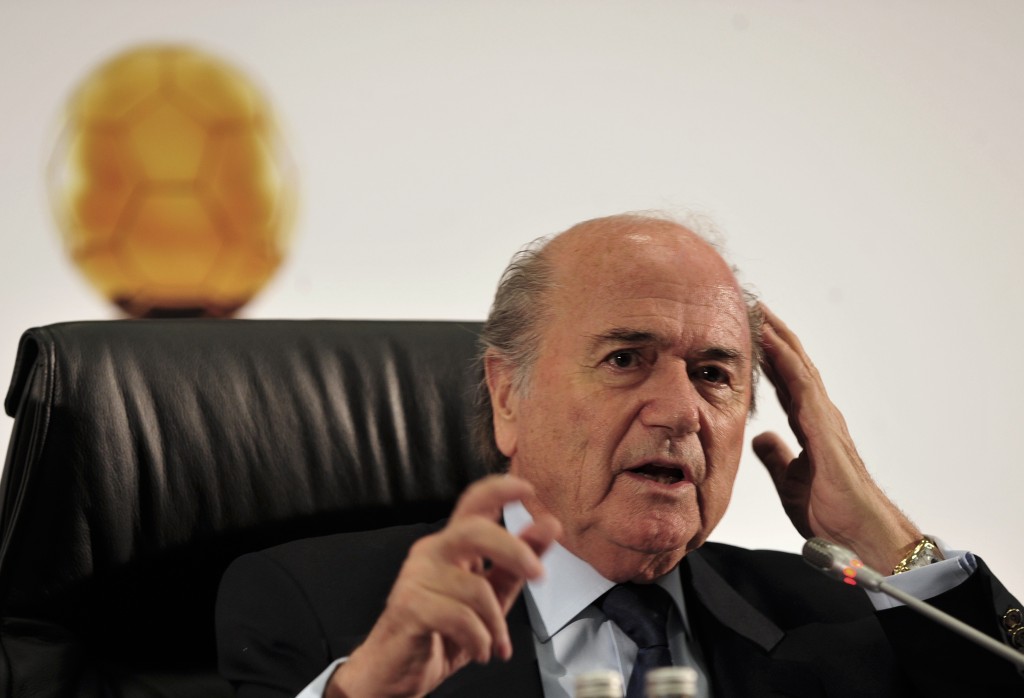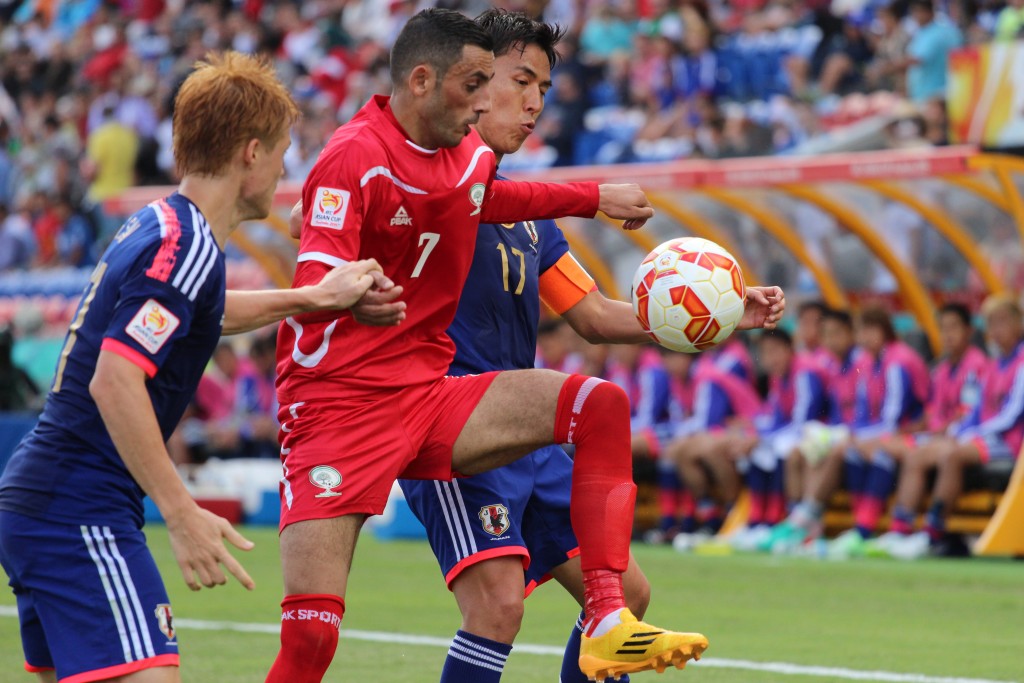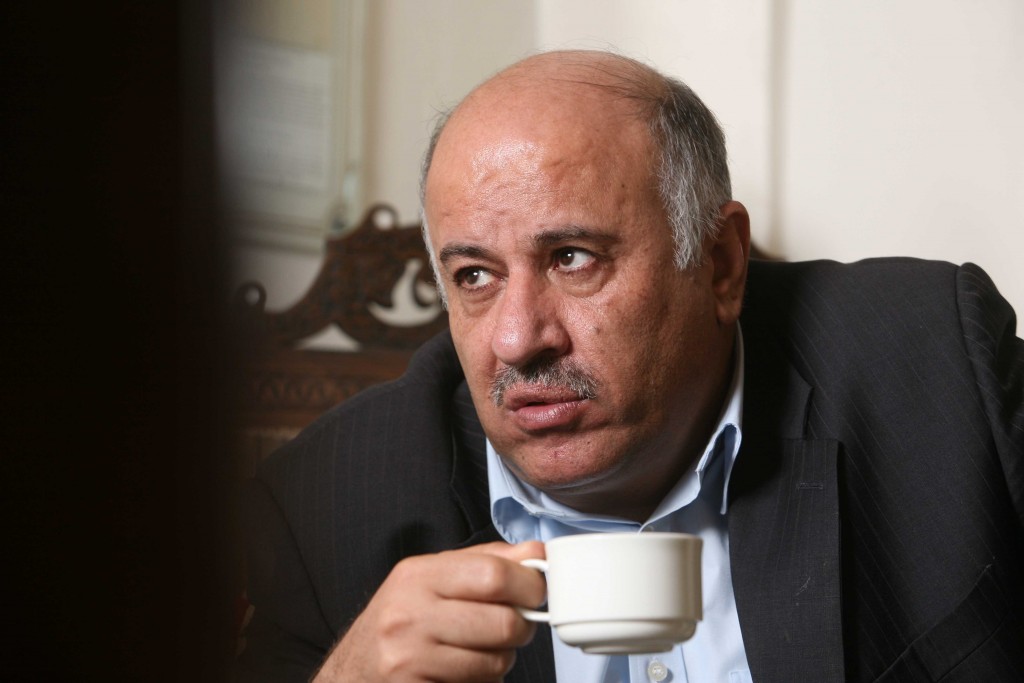While global soccer’s top execs were dealing with a corruption scandal, the Palestinian Authority tried to hijack yet another international body for their own “anti-normalization” campaign. And though FIFA now has more on its hands than it anticipated, efforts to demonize Israel in world sports will continue.
On May 28, a raid by Swiss police in Zurich, Switzerland, in cooperation with the FBI and IRS, led to the arrests of multiple officials of FIFA, the governing body of world soccer that has long been accused in the court of public opinion – and now in the courts of the Eastern District of New York – of almost unfathomable corruption. Praise for the United States and its judicial system was, somewhat unusually, heard throughout Latin America and Europe.
This, of course, made the annual FIFA Congress, which took place the following day, incredibly intriguing. But even amid dual American and Swiss corruption investigations that has continued to ensnare his top lieutenants, not to mention rising anger over the slave labor system that has led to the deaths of more than 1,000 migrant construction workers building stadiums for the 2022 World Cup in Qatar, FIFA president Sepp Blatter won his fifth election by a resounding margin. As Marina Hyde of The Guardian stated, Blatter “may well be the most successful non-homicidal dictator of the past century.” Though perhaps not successful enough—seeing the writing on the wall as criminal investigations drew ever closer, Blatter resigned on June 2, saying that FIFA needed a “profound restructuring.”
But Blatter’s reelection, though inexcusable, was not the most shameful issue on the agenda of the FIFA Congress. That was item 15.1: the proposal by the Palestinian Football Association (PFA) to suspend the Israel Football Association (IFA) from FIFA. The PFA took this action because, in the words of PFA president Jibril Rajoub, who is also a member of the Central Committee of the West Bank’s ruling Fatah party, “It is clear that the [IFA] is not willing to recognize the PFA as a federation with equal rights and obligations, just as they continue to violate their commitments made before FIFA. We are therefore determined to continue our path to suspend the [IFA] during the next FIFA Congress.”
Such an action had been in the works for the past few years. Rajoub proposed a similar motion before FIFA’s 2013 Congress, though it was withdrawn after mediation by Blatter and promises made by the IFA to help improve the situation for Palestinian athletes. And once again, Rajoub backed down this time, though not before taking the stage and denouncing Israel while brandishing a red card. Blatter’s compromise measure, which called for an internal committee to monitor and help address Rajoub’s complaints, was passed resoundingly by delegates.
Rajoub’s gambit was another facet of the Palestinian Authority’s escalating efforts to isolate and delegitimize Israel in bodies like the UN Human Rights Council and the International Criminal Court—politicizing organizations that could theoretically serve a noble purpose if they weren’t so consumed with anti-Israel animus. One of FIFA’s only saving graces over the past few years has been that it has done a decent job at staying neutral in the Israeli-Palestinian conflict while successfully working to develop soccer in both countries: In the last two years, FIFA has invested $4.5 million in infrastructure and stadium upgrades in the West Bank, and selected Israel to host the Men’s Under-21 and Women’s Under-19 European Championships. Approving the Palestinian proposal would have meant that, like a brilliant goal-scoring run called offside, it was all a lot of effort with nothing to show for it.
One of Blatter’s first actions upon becoming FIFA president in 1998 was recognizing Palestine as a full and official member. This should be unobjectionable regardless of one’s view on Palestinian independence—many places with complicated political statuses, including Scotland, Hong Kong, and Taiwan, are members of FIFA. But although the Palestinian Authority’s small size and undeveloped sports infrastructure meant that their team was always a longshot to qualify for the World Cup, the unique political complications of the Israeli-Palestinian conflict sometimes made things more difficult.
“Until now we have not had nuclear weapons, but in the name of Allah, if we had nuclear weapons, we’d be using them,” the Palestinian soccer chief once said.
Five Gaza-based players were prevented from joining the Palestinian national team for an away match against Uzbekistan to qualify for the 2006 World Cup after a suicide bombing in Beersheba caused Israel to close the borders; the portion of the squad that was able to travel to the match did not have enough players to make substitutions. And a 2007 match against Singapore to attempt qualification for the 2010 World Cup was forfeited after Israel denied travel permits to 18 Gaza-based players and coaches. This led to the creation of a hotline for Palestinian athletes to call if they were held up at the border with Israel; calling it prompts the Israeli Olympic Committee to attempt to intervene and help facilitate the border crossing. But problems persisted: FIFA was forced to step in after a 2013 incident in which Iraqi, Jordanian, and Emirati players and coaches were temporarily prevented by Israel from entering the West Bank to play in a youth tournament, leading Rajoub to “ask for a red card” and suspend Israel from FIFA. Instead, Blatter convened a task force consisting of himself, Rajoub, then-IFA president Avi Luzon, FIFA Vice President (and Prince of Jordan) Ali bin-Al Hussein, and the presidents of the Asian Football Confederation (of which the PFA is a member) and the Union of European Football Associations (of which Israel is a member, because Arab and Muslim countries in Asia refuse to play matches against teams from the Jewish state, forcing them to play European teams against whom they are generally outmatched).
The 2013 task force led to the creation of FIFA Circular 1385, a plan by which “The PFA shall notify the Palestinian authorities 35 days in advance of the possible movement of Players and Officials into, out of, and within Palestine. The Palestine authorities shall in turn inform the Israeli authorities.” This plan had the potential to be quite challenging. For example, the “Palestine authorities” in the West Bank are part of Fatah, which alternately partners with and fights civil wars against the terrorist group Hamas, which is the current “authority” of Gaza. Nor did the plan address the underlying security concerns from within Palestinian-controlled areas that forced Israel to restrict travel in the first place. Nevertheless, the task force’s designated monitor, Cyprus Football Association President Costakis Koutsokoumnis, reported earlier this year that he was satisfied with the progress made in implementing Circular 1385—more than 95 percent of Palestinian travel requests have been approved this year, according to the IFA. Koutsokoumnis also noted that the IFA could not be faulted for travel policies over which it had no control.
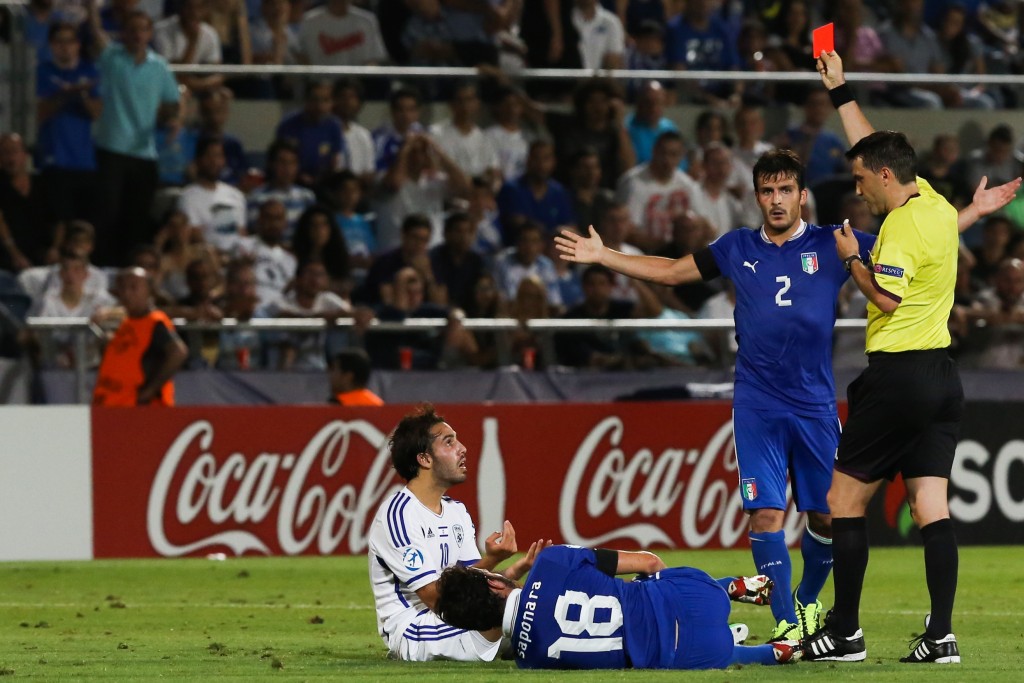
Israeli Eyal Golasa (in white) gets a red card during a UEFA European Under-21 Championships match between Israel and Italy at Bloomfield Stadium in Tel Aviv, June 8, 2013. Israeli teams cannot play against other teams from Asia due to an Arab and Muslim sports boycott, forcing them to play stronger European teams. Photo: Yonatan Sindel / Flash90
Blatter, for his part, spent the weeks before this year’s FIFA Congress meeting with the heads of the Israeli and Palestinian football associations, and even with Israeli Prime Minister Benjamin Netanyahu and Palestinian Authority President Mahmoud Abbas, to whom he proposed a friendly match between the two national teams. Netanyahu was receptive to the idea, and told Blatter and reporters that sports “is a vehicle of goodwill among nations. The thing that could destroy the Football Association is politicizing it. You politicize it once with Israel, then you politicize it for everyone, and it will cause the deterioration of a great institution.” But a meeting with Abbas and Rajoub was less successful—“We will keep the proposal on the agenda [of the FIFA Congress] for sincere and open discussions by the FIFA member associations,” Rajoub said at a press conference following the Blatter-Abbas meeting. “There will be no compromising on free movement of our athletes and officials.”
Throughout this whole process, Blatter has reiterated his opposition to the anti-Israel initiative: According to a May 7 statement, “any member association that is fulfilling its statutory duties should not be suspended. This would also apply to the IFA as long as they fulfill such duties.” And on May 15, he decried the political, rather than sports-based, nature of the PFA’s proposal: “We want to be in sport and not in politics. This would be a very dangerous precedent.”
Though the FIFA executive committee has in recent years suspended national football associations in Cameroon, Nigeria, and Belize due to violations of various FIFA rules, suspending a country from FIFA by a vote of the whole Congress has only been done to one other country before—South Africa. Article 14.2 of the FIFA Statutes mandates that such suspensions can only pass by a 75 percent majority. But despite Blatter’s opposition to the Palestinians’ nakedly political endeavor, despite the statement by Koutsokoumnis that the IFA is complying with FIFA, and despite the unlikelihood of getting anywhere near 75 percent of the vote, the Palestinians still pressed forward—until they didn’t. Perhaps it was just an exercise in airing grievances against Israel. Perhaps the leaders of the initiative actually thought they could win a vote, especially given that FIFA, like the UN General Assembly, gives one vote to each country, leaving open the possibility that, like at the UN, ingrained anti-Israel sentiment would matter more than the merits of a case. But the fact that the suspension vote nearly took place at all—and will likely take place, or “nearly” take place, every year going forward—shouldn’t be surprising, considering who is leading the charge: PFA president Jibril Rajoub, one of the most virulently anti-Israel and anti-peace members of the Palestinian leadership.
Following 15 years in prison for throwing a grenade at Israeli soldiers, Rajoub was freed in 1985 along with 1,149 other prisoners in exchange for three Israelis taken hostage by the Popular Front for the Liberation of Palestine. Rajoub threw away his newfound freedom by resuming (and being repeatedly arrested for) militant activities in the ensuing two years. He eventually became an aide to Yasser Arafat, serving as the head of the Palestinian Authority’s Preventive Security Force after Arafat’s post-Oslo return to the West Bank. As security chief, Rajoub was frequently accused of facilitating the torture of prisoners and political opponents. In addition to the PFA, he also heads the Palestinian Olympic Committee, which he has used as a perch to demand Israel’s expulsion from the global sports movement. Unlike most sports administrators, who believe in (or at least talk publicly about) the capacity for sports to unite people of different backgrounds, Rajoub has promoted no such pretense—he has said that Palestinian sports are “one of the methods of resistance” against Israel, and has emphasized that Palestinian youth—over whom he holds a good deal of influence as the PA’s sports czar—have a key role in creating a “permanent state of confrontation.” For example, a 2010 youth soccer tournament run under the auspices of the PFA—and attended by the PFA’s secretary-general “as a representative of Jibril Rajoub,” according to the official PA newspaper Al-Hayat al-Jadida—was called “The Prince of Martyrs Khalil al-Wazir 16th Football Tournament.” Al-Wazir, also known as Abu Jihad, was the mastermind of numerous terrorist attacks, including the deadliest one in Israel’s history, the 1978 Coastal Road massacre, in which 38 civilians, including 13 children, were killed in a bus hijacking.
Rajoub has publicly decried any form of normalization or coexistence with Israel. “I’m telling everyone: Fatah has decided that our relations with the Israelis are relations between enemies. There is no kind of coordination between the Israelis and us,” he said in an August 2014 TV interview. Taking him at his word would seem to indicate that Palestinian athletes’ travel difficulties might not be attributable to capricious Israelis, but rather stubborn Palestinian refusals to coordinate travel plans. In the same interview, Rajoub also said,
OK, brother, here is the occupation, am I stopping you from slaughtering a settlement? No one is stopping anyone. Don’t lie and tell me: “The [PA] Security Forces and Mahmoud Abbas,” drop it, OK? No one is stopping anyone. Our political decision is resistance in the occupied territories to bring an end to the occupation [using] all forms of resistance.
Rajoub’s favoring of “all forms of resistance” over coexistence, over even the barest trace of confidence-building measures, extends to the sports field. Speaking at a press conference for the Arab Sports Press Association in May 2012, Rajoub said,
Normalization with the occupation is impossible, impossible, impossible, with no exceptions….I understand by normalization that the relationship between me and you will be normal, that we’ll play [sports] together and there will be a joint program. I say: There will never be normalization in sports….Next time, we are prepared to bring the Executive Committee in helicopters…so they will see no Jews, no Satans and no Zionist sons of bitches.
His opposition to cooperation through sports was not merely hypothetical. In September 2014, after a foundation led by former Israeli President and Nobel Peace Prize winner Shimon Peres held a soccer program with Israeli and Palestinian kids to promote peace and coexistence, Rajoub slammed the program, stating that “any activity of normalization in sports with the Zionist enemy is a crime against humanity.”
“I love it when we play together like this,” a Palestinian boy at the event told an AFP reporter. “I hope that one day there will be peace between Arabs and Jews and that there will be no more wars and death.” This, apparently, is not an attitude that Rajoub wants to foster.
Sometimes Rajoub says things about sports that, out of context, sound quite nice: “Sports are a bridge for love, communication and the spreading of peace between nations and should not be used for divisiveness and the spread of racism,” he wrote to International Olympic Committee president Jacques Rogge just before the 2012 Summer Olympics. But in this case, Rajoub was thanking Rogge for saying no to “racism” by refusing to include a moment of silence at the opening ceremony for the Israeli athletes who were murdered at the 1972 Munich Olympics by Palestinian terrorists—terrorists who were members of Rajoub’s political party.
According to Rajoub, sports are a bridge for the spreading of peace, unless the sports involve Palestinians, in which case sports become “a means to achieve national goals” and “a tool of struggle to present the Palestinian cause.” It’s clear that Rajoub’s FIFA initiative is designed to delegitimize and attack Israel. And it’s likely that he is using his position as a populist platform to garner support for the eventual battle to succeed Abbas as head of the Palestinian Authority. But it’s fair to ask whether Rajoub has ever intended to improve the situation for Palestinian soccer players at all. In fact, his refusal until February of this year—in violation of FIFA rules—to allow Palestinian players to be transferred to Israeli teams may confirm it.
This seems especially evident because Rajoub is not accusing the Israel Football Association of violating any FIFA statutes. Instead, he came before FIFA with four generalized complaints about Israeli soccer (though he dropped one before the vote).
Not surprisingly, when one looks at his four complaints, it is pretty obvious that his arguments have little to stand on. One complaint—that Teddy Stadium in Jerusalem is located over the 1949 armistice lines (commonly known as the “Green Line”), and thus should not be used for international matches, as it sometimes is—can be debunked by looking at Google Maps. Teddy Stadium is not over the Green Line. Rajoub did not mention Teddy Stadium in his speech at the FIFA Congress.
Another complaint is that Israeli soccer fans, especially fans of Beitar Jerusalem—the club that plays at Teddy Stadium—are often racist. This, unfortunately, is true. Beitar fans have made monkey noises in front of black players, chanted “death to Arabs,” and have flown the flag of the racist Kach party, which is the only political party in Israeli history to be banned. But if the presence of racist fans is grounds for a country to be suspended from FIFA, then Italy, Russia, Holland, England, and Spain, among many, many other countries, ought to be suspended too. And to its credit, the IFA has repeatedly punished Beitar for its fans’ actions through fines, docking points, and forcing them to play in an empty stadium.
Beitar is also the only major club in Israel to never have had an Arab player. All other clubs, as well as the Israeli national team, contain, and sometimes star, Arab athletes. The rest of Israel has discovered what baseball teams quickly learned when they played against Jackie Robinson’s Brooklyn Dodgers—leaving aside its moral awfulness, preventing a whole race from playing on your team is simply poor sporting strategy. Things may finally be changing, though, as Beitar is currently under investigation by Israel’s Equal Employment Opportunities Commission.
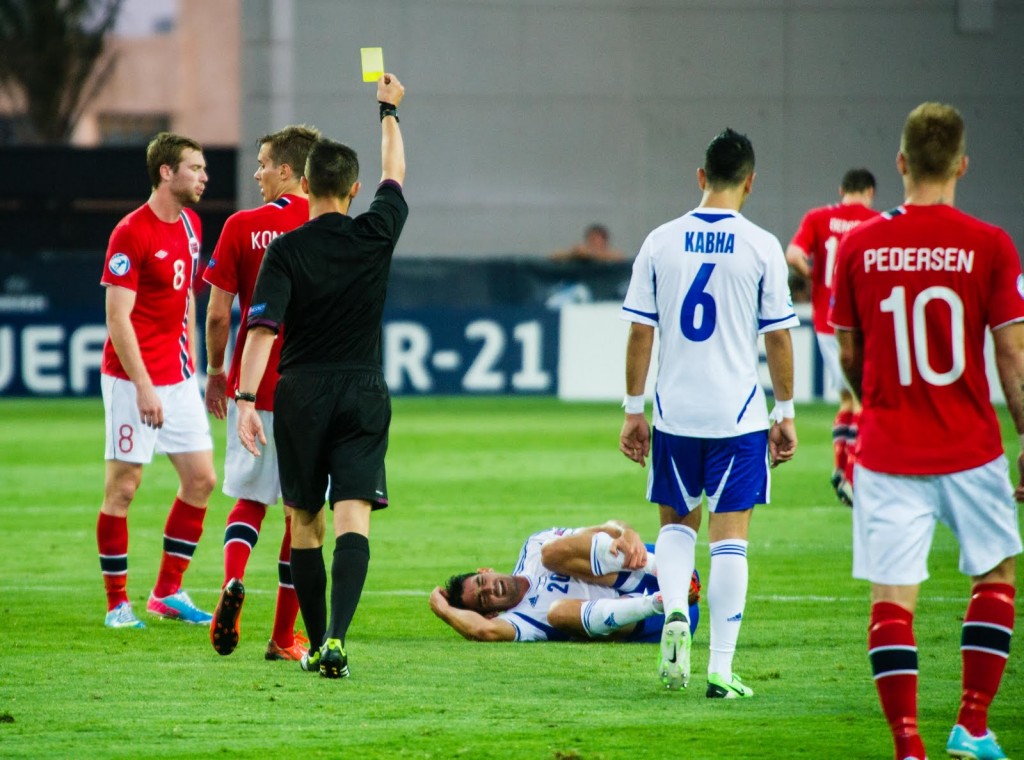
Israel (in white) plays Norway in the 2013 European Under-21 Championship tournament, which took place in Israel. The tournament’s championship game was held at Jerusalem’s Teddy Stadium. Photo: David Katz / The Israel Project / flickr
A third element of the Palestinian complaint is that five lower-level Israeli teams—Beitar Ironi Ariel, Hapoel Bik’at Hayarden, Beitar Givat Ze’ev, Ironi Yehuda, and Beitar Ironi Ma’aleh Adumim—are based in the West Bank, over which, the PFA argues, the IFA has no authority. As part of his “compromise” proposal to form a committee, Rajoub tried to get FIFA to refer the question of the legality of the five teams to the UN—a move Blatter publicly rejected. Blatter’s move was logical and defensible (a sentence I never thought I would write), because as a private organization, FIFA should have the right to determine the eligibility of its countries and teams. Of course, this means that FIFA, of all the organizations in the world, is now going to try to adjudicate the legitimacy of the settlement enterprise. But look: There are hundreds of thousands of Jews living in the West Bank, and considering the current prospects for an Israeli-Palestinian peace deal, it’s unlikely that they’re leaving anytime soon. It’s possible that some of these people might want to start a soccer team. At that point, there are two possibilities—they could join the Israel Football Association, which is affiliated with the country that they hold allegiance to; or they could join the Palestinian Football Association, which is run by a man who once said, “Until now we have not had nuclear weapons, but in the name of Allah, if we had nuclear weapons, we’d be using them.”
The final Palestinian claim is the one that first drew the world’s attention to the conflicts over soccer in the Holy Land: That Israel restricts the travel of players, coaches, and officials between the West Bank and Gaza, and between those places and other countries; that it prevents foreign soccer teams from traveling to Palestinian-controlled territories; and that it damages Palestinian soccer facilities. FIFA has already indicated that the IFA has no control over the Israeli security policies that cause these issues, and that the IFA is working with Israeli authorities to address these issues. But it’s worth examining why, exactly, the Israeli security apparatus is not content with giving Palestinian soccer players a free pass. Israel has learned the hard way that, just like with seemingly innocent ambulances or pregnant women, Palestinian terrorists have taken advantage of Israeli good intentions by using soccer players and facilities to stage attacks.
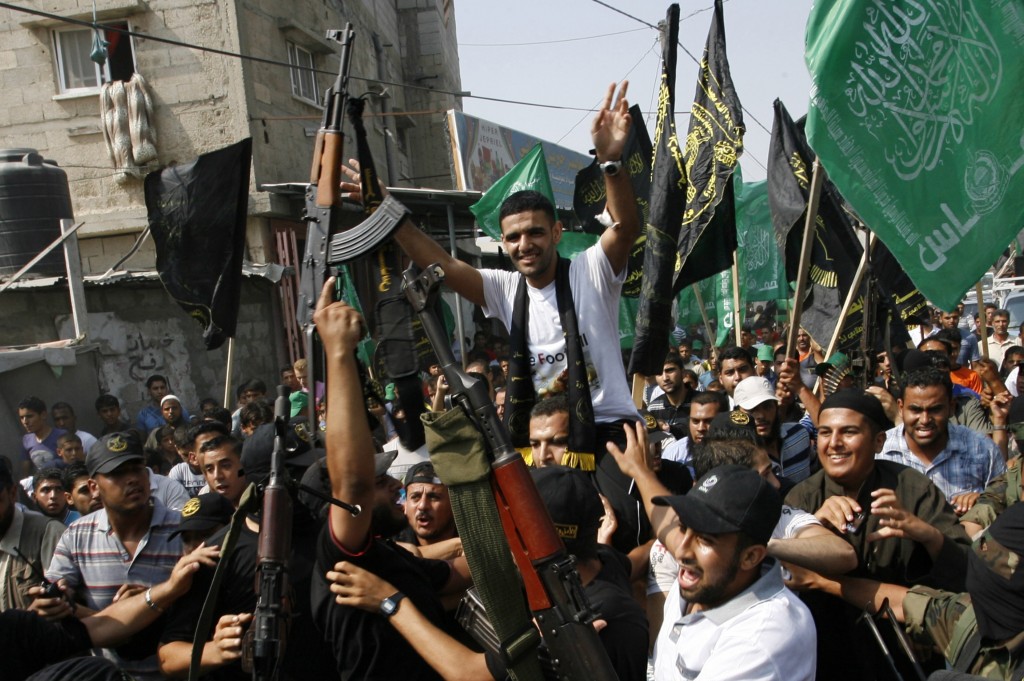
Palestinian soccer player Mahmoud Sarsak celebrates being freed from Israeli prison, July 10, 2012. Sarsak was detained under suspicion of belonging to the terrorist group Palestinian Islamic Jihad (PIJ), a charge he never denied. Black PIJ flags are waving behind him in his parade. Photo: Abed Rahim Khatib / Flash90
22-year-old Palestinian soccer player Mahmoud Sarsak was detained at a Gaza border crossing in 2009. Sarsak, who had twice played for the Palestinian national team, was suspected of being a member of the terrorist organization Palestinian Islamic Jihad (PIJ). Israel’s internal security service, the Shin Bet, alleged that Sarsak had planted a bomb that injured an Israeli soldier, but it did not have enough evidence for trial. After being detained under Israel’s Unlawful Combatants Law, he became a cause célèbre in the European soccer community. Soccer legends like Lilian Thuram and Eric Cantona, not to mention Sepp Blatter himself, petitioned for Sarsak to be released. But Sarsak’s detention was upheld by district courts, and then the Supreme Court, every six months, as mandated by the law, because, as the court ruled after being provided with intelligence, Sarsak might attempt to rejoin the terror organization if he was released. As a point of fact, Sarsak’s petition to the Israeli Supreme Court never denied that he was a PIJ member, only that too much time had elapsed between actively participating in PIJ activities for him to be considered a security risk. And when he was released in 2012, the PIJ held a parade in his honor in Gaza City, where PIJ leader Nafez Izzam called him “one of our noble members.”
There are many stories of Palestinian soccer players hailed by international observers as victims of Israeli malfeasance, only for the truth to later emerge that the allegations of participation in terrorism and violent activities were genuine. In January 2014, two teenage Palestinian soccer players claimed that as they were walking back from practice, they had been purposefully shot in the feet by Israeli soldiers before the soldiers sicced dogs on them. This claim, in fact, can still be seen on online comment boards and anti-Semitic conspiracy websites. But their stories, which were published on Palestinian news websites, contained multiple discrepancies, including the date of the incident, their point of origin, and the location of their alleged assault by the IDF. It then emerged that not only were the boys not shot in the feet, their own Facebook photos from the hospital revealed that their feet had no injuries at all (among the people to visit them at the hospital was Jibril Rajoub). In fact, as the Israeli Border Police said in a statement to Haaretz about the incident, they were apprehended while throwing live bombs at policemen:
During operational activity, a group of individuals was seen just seconds before throwing bombs at security forces. When they saw the Border Policemen, the group attempted to run away and tried again to throw bombs at the policemen. The policemen initiated the protocol for opening fire in order to neutralize the threat. The suspects were apprehended, and a bomb was found on them, which has been deactivated.
There are numerous examples of Palestinian soccer players who have been publicly acknowledged by terrorist groups to have been members of their organizations. Jabalia Youth Sports Club player Ayman Ahmad al-Kurd was a member of the Qassam Brigades (which acknowledged his martyrdom on their website) and was wearing combat gear when he died during Operation Cast Lead. PIJ admitted—to Reuters, no less—that Wajih Mushtahi, a member of the Palestinian Olympic team who also died in Cast Lead, was a fighter in their organization. Shadi Sbakhi, who played for al-Nuseirat and once earned a spot on the national team, was not just an operative in the Qassam Brigades, but a commander.
The most egregious case, though, was that of 23-year-old Omar Abu Rwayyis (also spelled Rois or Ruis), a native of the Amari refugee camp near Ramallah, who in addition to being the goalkeeper of the Palestinian Olympic team was also an employee of the Red Crescent, the local version of the Red Cross. Abu Rwayyis was arrested in April 2012, along with 12 other Amari residents, for participating in a Hamas plot to attack IDF soldiers. Abu Rwayyis, along with other Red Crescent employees, helped transport Kalashnikovs that were used to fire on IDF vehicles. Even if 99% percent of Palestinian soccer players are totally disconnected from terrorism (and are totally impervious to the pro-terrorism brainwashing that takes place at youth tournaments), the actions of players like Abu Rwayyis have created a real risk to the Israeli population that the security forces are obligated to act upon. And even though in recent months restrictions on Palestinian athletes’ travel have been eased—46 Gazans were allowed to travel to the West Bank to run a marathon—Israel’s hesitancy to simply wave through soccer players (or Red Crescent employees, for that matter) is justified. This is to say nothing of the repeated use of Gaza soccer stadiums as launching pads for rockets fired on Israeli civilians, forcing the Israeli Air Force to destroy them.
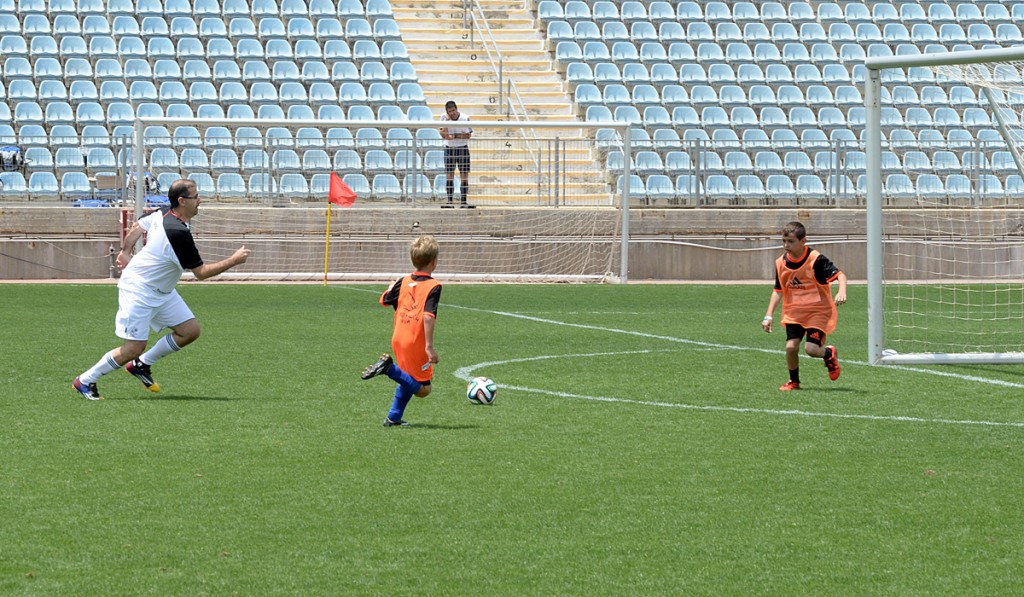
U.S. Ambassador to Israel Dan Shapiro (left) plays soccer with Israeli and Palestinian children at a program organized by the Peres Center for Peace. Photo: U.S. Embassy Tel Aviv / flickr
Jibril Rajoub must know all this. And if he is a student of the FIFA bylaws, he would also know that he and his federation are likely in violation of article 3 of the FIFA Statutes (“Discrimination of any kind against a Country…or group of people on account of…national or social origin…is strictly prohibited and punishable by suspension or expulsion”), article 14 of the FIFA Code of Ethics (“In dealings with government institutions, national and international organizations, associations and groupings, persons bound by this Code shall…remain politically neutral”), and possibly article 53.1 of the FIFA Disciplinary Code (“A player or official who publicly incites others to hatred or violence will be sanctioned with match suspension for no less than twelve months and with a minimum fine of CHF 5,000”). Of course, Israel Football Association president Ofer Eini didn’t bring this up at the FIFA Congress, instead choosing to take the high road and shake Rajoub’s hand. In fact, in the days before the Congress, Israel even offered a compromise to the Palestinians, as the Times of Israel described:
Granting Palestinian soccer players and coaches special identification cards to allow them to pass more or less freely between Gaza and the West Bank, and between the West Bank and Israel’s Ben Gurion Airport so they could travel overseas with minimal hindrance; aid and approval for the construction of stadiums and soccer fields in the West Bank; tax exemptions for sporting supplies passing through Israeli ports on their way to Palestinian soccer clubs; and the establishment of a trilateral committee of officials from Israel, the Palestinian Authority and FIFA that would be tasked with resolving problems as they arise.
Rajoub rejected the compromise, only to promote a compromise deal of his own, one that will create a committee that will likely draw the same conclusions as Koutsokoumnis—that the IFA cannot control the IDF’s actions, while the IDF must maintain a tricky balance between freedom for Palestinian athletes and security for Israeli citizens who may be threatened by Palestinian athletes who try to murder Israelis in their off hours. Rajoub has now come under heavy criticism from even harder-line elements in Palestinian society for failing to achieve Israel’s suspension (strangely, he did not come under criticism for turning down a deal that would have solved the complaints that ostensibly led to his call for Israel’s suspension in the first place). But since Rajoub is accountable to practically no one, he can continue to make unreasonable demands at every subsequent FIFA Congress—and International Olympic Committee meetings as well.
George Orwell was a brilliant man and a historically important writer, but the one thing he never truly understood was soccer.
In December 1945, Orwell wrote an essay called “The Sporting Spirit” for the London newspaper Tribune. The Soviet soccer club Dynamo Moscow had just completed a tour of the UK, playing matches against top British clubs like Arsenal and Rangers—matches that degenerated into rough play on the pitch and jingoism in the stands. Orwell, a fervent opponent of nationalism, was appalled. “Serious sport has nothing to do with fair play,” he wrote. “It is bound up with hatred, jealousy, boastfulness, disregard of all rules and sadistic pleasure in witnessing violence: in other words it is war minus the shooting.”
It is true that soccer can bring out the worst in, and of, humanity. It can enable racism, sexism, homophobia, corruption, and mob violence. It can enflame nationalist tensions and give legitimacy to authoritarian regimes. But soccer can also bring out the best in us. It can unify war-torn nations and lift the spirits of impoverished communities. It can impose 90 minutes of order on a world that has seemingly never been so chaotic.
It’s never wise—and perhaps not possible—to underestimate FIFA’s ability to hit a new moral low. And it’s unclear who will be on that FIFA committee to monitor the Palestinian situation—or even if there will be a FIFA six months from now. But so long as the possibility exists of suspending Israel from soccer, it leaves open the terrible possibility that Orwell was right—that the Beautiful Game is nothing more than a front in a decades-long battle, and its fans are merely its conscripts.
***
Editor’s Note: This article has been updated to reflect recent events. To see the original version, click here.
![]()
Banner Photo: Yonatan Sindel / Flash90






